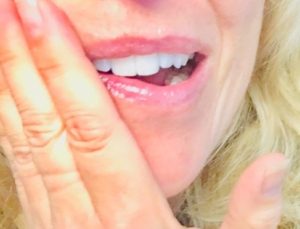Dental Tips, News
Sensitive Teeth – OUCH!
Having sensitive teeth can mean many things from a mild twinge to having severe discomfort that can continue for several hours. It can also be an early warning sign of more serious dental problems.
 Some causes of sensitivity include:
Some causes of sensitivity include:
- Brushing too hard: (‘toothbrush abrasion’) can cause enamel to be worn away.
- Dental erosion: this is loss of tooth enamel caused by attacks of acid from acidic food and drinks. If enamel is worn away, the dentin underneath is exposed which may lead to sensitivity.
- Gums may naturally recede (shrink back), and the roots of the teeth will become exposed and can be more sensitive. Root surfaces do not have an enamel layer to protect them.
- Gum disease: a build-up of plaque or tartar can cause the gum to recede down the tooth and even destroy the bony support of the tooth. Pockets can form in the gums around the tooth, making the area difficult to keep clean and the problem worse.
- Tooth grinding: this is a habit which involves clenching and grinding the teeth together. This can cause the enamel of the teeth to be worn away, making the teeth sensitive.
- A cracked tooth or filling: this is exactly what it is! Your tooth may be sensitive to temperatures while you eat or drink following this event and may also be sharp to your tongue.
- Tooth bleaching: you may have sensitivity for a short time during bleaching or afterwards. Talk to your dental team about this before having treatment.
Is there anything I should avoid if I have sensitive teeth?
You may find that hot, cold, sweet or acidic drinks, or foods like ice cream, can bring on sensitivity, so you may want to avoid these. If you have sensitivity when brushing your teeth with cold water from the tap, you may need to use warm water instead. It is important to keep brushing your teeth regularly – if you don’t, this could make the problem worse.
Do I need to see my Dentist?
Yes! If you haven’t noticed any improvements over a couple of weeks and your symptoms are about the same; we would still recommend you see your Dentist as there may be underlying issues. If you’re symptoms seem to be getting worse (pain, bleeding, swelling, difficulty eating/drinking, waking you up at night); see your Dentist immediately.
What treatments can the dentist offer?
During an examination your dental team will talk to you about your symptoms. They will look at your teeth to find out what is causing the sensitivity and to find the best way of treating it. The dental team may treat the affected teeth with special ‘de-sensitising’ products to help relieve the symptoms.
Don’t wait if you’re experiencing sensitivity with your teeth…visit your dentist as recommended. When in Doubt…check it out!
Follow us on Instagram @shaughnessydental
Follow us on Twitter @ShaughnessyDental @ShaughnessyDen2
Comments are closed


